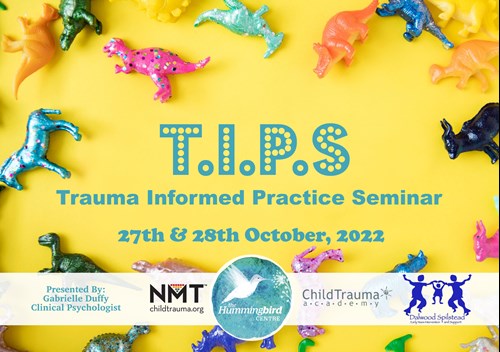Trauma Informed Practice
2-Day Workshop
Trauma Informed Practice Seminar
This two-day workshop will explore the impact of trauma on neurodevelopment in childhood and introduce the Neuro-Sequential Model of Therapeutics (NMT) developed by Dr Bruce Perry. This workshop is designed to give practical resources that can be used in therapeutic settings and classrooms, helping to increase understanding of underlying causes of difficulties experienced by traumatised children and optimal modes of intervention.

Programme
Programme Summary
DAY 1:
Understanding the neuroscience impacting “tricky kids”; Why challenging kids behave as they do: A Trauma Informed/NMT perspective
- How early developmental trauma impacts the developing brain and contributes to the social, emotional, behavioural and learning challenges seen in children who have experienced neglect and abuse. The neuroscience behind their behaviour will be presented in an easy to understand way.
- Brain organisation from an NMT perspective and how different systems of the brain are impacted by trauma in different ways depending upon the nature, severity and timing of the trauma.
- The stress response, how it becomes overdeveloped in traumatised children and the way this impacts future functioning
- The importance of “state of arousal” in understanding tricky kids
- Self-regulation: what is it and the importance of somato sensory strategies in helping traumatised children
- “Bottom UP” versus “Top Down” strategies to help with self-regulation
- The vital role of relationship in working with tricky kids
DAY 2:
Practical applications of the NMT Informed Approach with children
Day 2 will focus on how we translate the knowledge gained from Day 1 into practical strategies in working with “tricky kids”
- Setting up a trauma informed environment (day care setting, classroom, home, residential setting)
- Incorporating regulation strategies into a child’s day/week: Utilising Dr. Perry’s concept of “therapeutic dosing” – providing the therapeutic experiences children and young people need across their day-to-day relationships and environments.
- Incorporating Dr Kristie Brandt’s “Tile and Grout” approach – which draws on the developmental assessment of the child to target specific interventions, activities and experiences for and with the child, delivered by carers, parents, family, teachers and other people in the child’s network (therapeutic web).
- Building relationship with kids who can be hard to connect to
- Managing “behaviour” in kids with a trauma background
About the Presenter
Gabrielle Duffy is a Clinical Psychologist with over 27 years experience working with children and families. She has worked in a paediatric hospital setting, in child and family community health, Royal Far west Service for children from rural NSW and in private practice. For the last 15 years, Gabrielle has been involved with the Dalwood Spilstead Service on Sydney’s Northern beaches. This service is unique in Australia in providing a “one stop shop” of intensive early intervention for vulnerable children and families. The service has embraced the philosophy and practice implications of Dr Bruce Perry’s Neurosequential Model of Therapeutics (NMT) across all aspects of service provision over the past 6 years.
Dalwood Spilstead is one of only 2 services in New South Wales fully accredited to provide comprehensive, trauma informed interventions using the NMT assessment tool. Gabrielle is an accredited Phase 2 practitioner in the NMT approach and provides training for individuals and organisations working with vulnerable children. She also runs a clinic for children in Out of Home care providing assessments and intervention plans for the most challenging of children.
